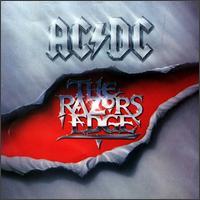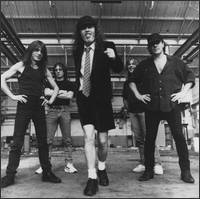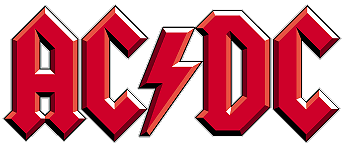| AC/DC's mammoth power-chord roar became one of the most influential hard rock sounds of the '70s. In its own way, it was a reaction against the pompous art rock and lumbering {stadium rock of the early '70s. AC/DC's rock was minimalist -- no matter how huge and bludgeoning the guitar chords were, there was a clear sense of space and restraint. Combined with Bon Scott's larynx-shredding vocals, the band spawned countless imitators over the next two decades. AC/DC was formed in 1973 in Australia by guitarist Malcolm Young after his band, the Velvet Underground, collapsed (Young's band has no relation to the seminal American group). With his younger brother Angus as lead guitarist, the band played some gigs around Sydney. Angus was only 15 years old at the time and his sister suggested that he should wear his school uniform on stage; the look became the band's visual trademark. While still in Sydney, the original lineup (featuring singer Dave Evans) cut a single called "Can I Sit Next to You," with ex-Easybeats Harry Vanda and George Young (Malcolm and Angus' older brother) producing. The band moved to Melbourne the following year, where drummer Phil Rudd (formerly of the Coloured Balls) and bassist Mark Evans joined the band. The band's chauffeur, Bon Scott, became their lead vocalist when their singer, Dave Evans, refused to go on stage. Previously, Scott had been a drummer for the Australian pop bands Fraternity and the Valentines. More importantly, he helped cement the group's image as brutes -- he had several convictions on minor criminal offenses and was rejected by the Australian Army for being "socially maladjusted." And AC/DC was socially maladjusted. Throughout their career they favored crude double entendres and violent imagery, all spiked with a mischievous sense of fun. The group released two albums -- High Voltage and TNT -- in Australia in 1974 and 1975. Material from the two records comprised the 1976 release High Voltage in the U.S. and U.K.; the group also toured both countries. Dirty Deeds Done Dirt Cheap followed at the end of the year. Evans left the band at the beginning of 1977, with Cliff Williams taking his place. In the fall of 1977, AC/DC released Let There Be Rock, which became their first album to chart in the U.S. Powerage, released in spring of 1978, expanded their audience even further, thanks in no small part to their dynamic live shows (which were captured on 1978's live If You Want Blood, You've Got It). What really broke the doors down for the band was the following year's Highway to Hell, which hit number 17 in the U.S. and number eight in the U.K., becoming the group's first million-seller. AC/DC's train was derailed when Bon Scott died on February 20, 1980. The official coroner's report stated he had "drunk himself to death." In March, the band replaced Scott with Brian Johnson. The following month, the band recorded Back in Black, which would prove to be their biggest album, selling over ten million copies in the U.S. alone. For the next few years, the band was one of the largest rock bands in the world, with For Those About to Rock We Salute You topping the charts in the U.S. In 1982, Rudd left the band; he was replaced by Simon Wright. After 1983's Flick of the Switch, the band's commercial standing began to slip; they were able to reverse their slide with 1990s The Razor's Edge, which spawned the hit "Thunderstruck." While they haven't proved to be the commercial powerhouse they were during the late '70s and early '80s, the '90s have seen them maintain their status as a top international concert draw. In the fall of 1995, their sixteenth album, Ballbreaker, was released. Produced by Rick Rubin, the album received some of the most positive reviews of AC/DC's career. Ballbreaker entered the American charts at number four and sold over a million copies in its first six months of release. Stiff Upper Lip followed in early 2000.
Stephen Thomas Erlewine, All Music Guide
|



